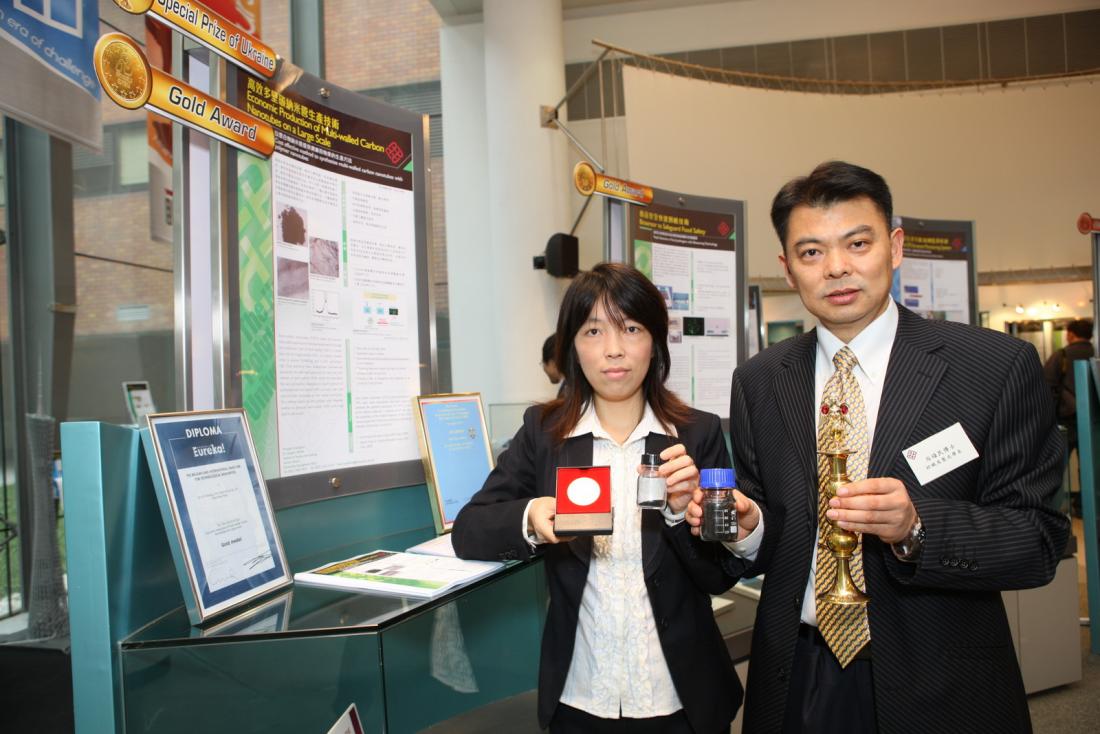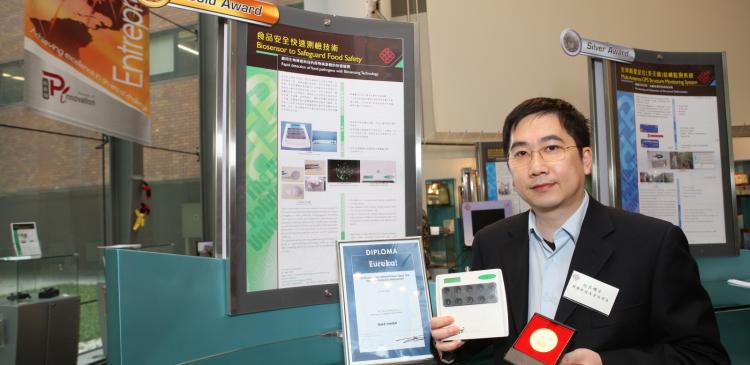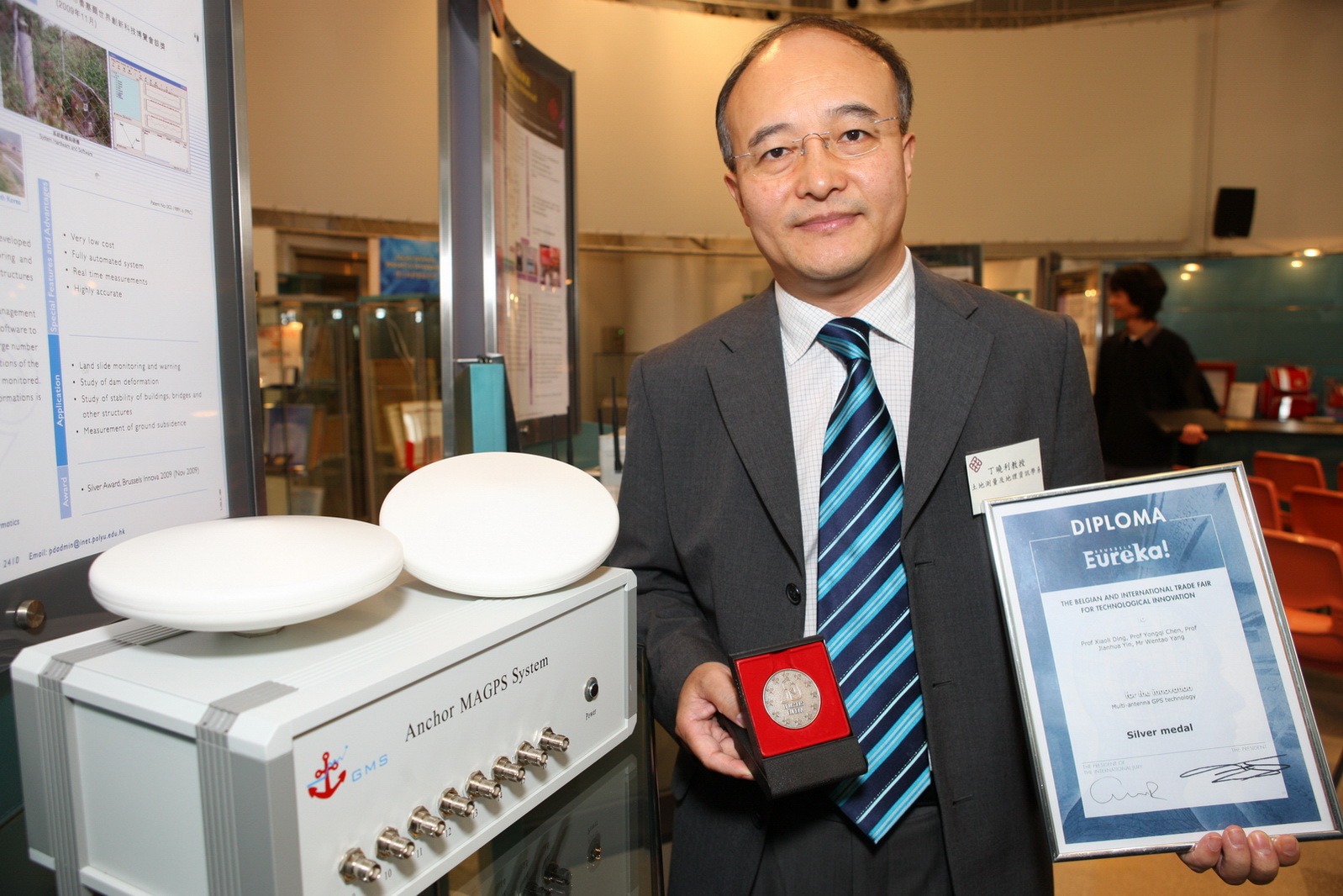Gold Medal and Special Prize: Economic Production of Multi-walled Carbon Nanotubes (CNTs) on a Large Scale
The Hong Kong Polytechnic University (PolyU) has brought home two Gold Medals for its breakthroughs in nanotechnology, including a novel method for producing carbon nanotubes economically and a rapid testing technique for identifying food contamination using nano-biosensing technology, at the International Eureka Contest of Brussels Innova 2009.
On top of two Gold Medals, PolyU researchers also won a Silver Medal for its GPS technology for landslide monitoring, and a Bronze Medal for its innovation for the enhancement of wireless communication network in this international event.
Dr Lui Sun-wing, Vice President (Partnership Development), said the prestigious awards are strong proofs that PolyU innovations are recognized internationally. Dr Lui further said that the advanced carbon nanotubes technology also won a Special Prize and all these technologies are relevant to enhancing health, safety and quality of life in the community.
The long-standing International Eureka Contest has put together some 450 inventions from more than 30 countries and territories this year. These awards were selected by a panel of judges comprising senior members from both academia and industry. Interested parties are welcome to explore and develop collaboration with PolyU on the commercialization of these advanced technologies.
The winning projects are presented today (14 December) at a press briefing held on the campus. Description of the projects and their Principal Investigators are listed as follows:
(1) Gold Medal and Special Prize: Economic Production of Multi-walled Carbon Nanotubes (CNTs) on a Large Scale
Principal Investigator: Dr SHANG Songmin, Assistant Professor, Institute of Textiles and Clothing
While the discovery of carbon nanotubes (CNTs) has led to many useful applications, the cost of production has unfortunately hindered its progress and widespread commercial application. It is known that the production cost of multi-walled CNTs is lower than that of single-walled CNTs, but the market price at its lowest is still very expensive (about HK$1 million/tonne). Scientists worldwide have therefore been looking for an alternate approach to cut down the cost of producing multi-walled CNTs which consist of multiple rolled layers of graphite.
In studying CNTs, PolyU researchers including Professor TAO Xiao-ming and Dr YANG Xiaoming have successfully developed a novel method to synthesize the multi-walled CNTs at a very low cost with polymer nanotubes as the carbon precursor. Since the polymers in use are abundant in supply and the equipment set-up is simple and easy to control, this important discovery has become the simplest and cheapest method to produce multi-walled CNTs with high yield. This method is also safe and no dangerous raw materials or by-products are created in the process, making it more viable for industry applications relating to nanotechnology, electronics, optics and material science.
(2) Gold Medal: BioSensor to Safeguard Food Safety
Principal Investigator: Dr YANG Mo, Assistant Professor,
Department of Health Technology and Informatics (HTI)
This is an important breakthrough in safeguarding food safety by checking for food contamination in an instance. Food contamination is a major issue of community health in the world. In the food industry, materials are likely to contain pathogens or other undesirable micro-organisms. However, most inspection works are currently performed in laboratory settings with testing procedures, and its takes overnight to verify the results by skillful personnel. There is a need for developing a portable device for rapid food screening.
The portable device invented by PolyU researchers including the key team member Dr LEUNG Hang-mei of HTI works with a disposable testing membrane which thrives on nano-biosensing technology. With this simple device, frontline users can conduct on-site screening for food samples within merely 30 minutes with a reasonable level of accuracy. This practical device will bring much convenience to the personnel of government regulation bodies, supermarkets, restaurants, food manufacturing industry, etc.
(3) Silver Medal: Multi-Antenna GPS Structure Monitoring System
Principal Investigator: Professor DING Xiaoli, Chair Professor and Head, Department of Land Surveying and Geo-Informatics (LSGI)
This multi-antenna GPS technology is developed for applications such as landslide monitoring and warning, tracking of deformations of mega-structures such as dams and bridges, and measurement of ground subsidence. This technology makes use of special GPS data management and processing algorithms, hardware and software to enable one GPS receiver to work with multiple antennas so that the deformations of all the points equipped with the antennas can be closely monitored. The overall cost of GPS hardware for such applications can be significantly reduced compared to standard GPS systems. The capacity of GPS for monitoring deformations and irregularities of structures has been greatly enhanced.
This breakthrough is developed by an inter-disciplinary research team led by Professor Ding with the following key members: Professor CHEN Yongqi of LSGI, Professor YIN Jianhua of the Department of Civil and Structural Engineering; and Mr YANG Wentao of LSGI. Collaborations have also been made in the development with researchers in China and Australia.
(4) Bronze Medal: Heterogenenous Advanced Wireless Networks (HAWK)
Principal Investigator: Professor CAO Jiannong, Associate Head, Department of Computing
In the next generation of mobile wireless networks, all kinds of advanced wireless networking technologies such as 3G cellular networks, wireless mesh networks (WMNs) and wireless local area network (WLAN) will be integrated to provide Internet users with wider coverage across the boundaries of different wireless networks. With a view to develop practical techniques for enhancing wireless communication and mobility, PolyU researchers have developed this high performance HAWK platform. Using HAWK technologies, Internet applications (such as video conferencing and VoIP applications) available within each wireless network will be continuously provided to users when they roam across different networks.
The Brussels Innova 2009 was held between 19 to 21 November in Belgium this year. For more details about this event, please visit its official website at URL: www.brussels-eureka.be





